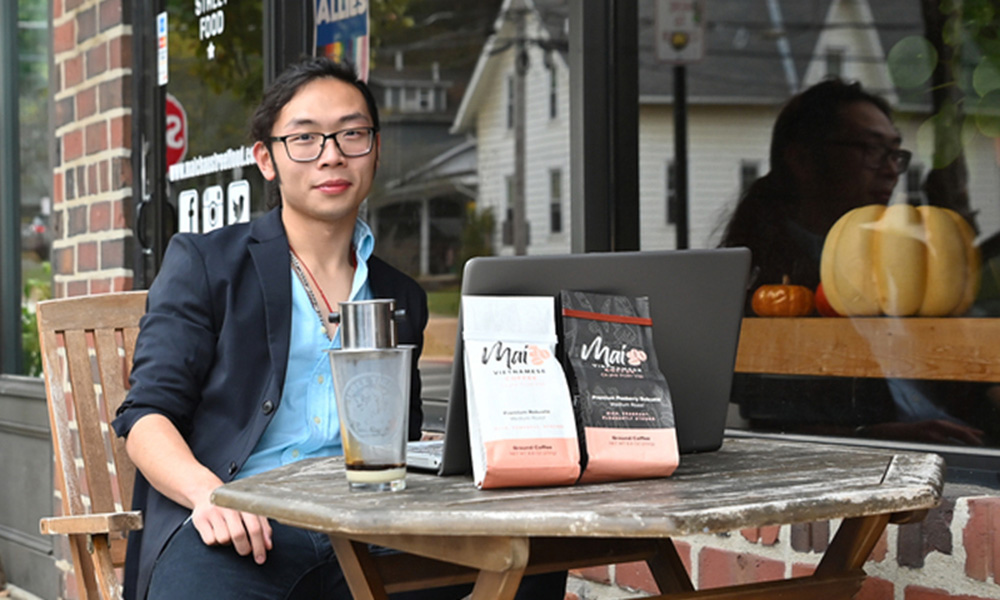In 2019, we introduced Denison audiences to Alan Phung ’22 and his start-up, Mai Coffee. His initial concept, to import and roast Vietnamese coffee beans to brew and sell a bottled coffee beverage, has undergone a few revisions.
He’s learned (and earned) a lot of entrepreneurial acumen and know-how during the past two years. Here are some of the lessons he is applying to his business today.
#1 Do Your Research and Be Flexible
Phung’s memories of drinking coffee with his Vietnamese father were the inspiration for Mai Coffee. The original plan, to package pre-brewed Vietnamese coffee in bottles, may have been delicious but turned out to have a few pitfalls.
Selling any form of comestible requires a working knowledge of food science. Phung’s initial research uncovered a daunting array of regulatory requirements imposed at each stage of production.
“I realized that I just couldn’t gather enough knowledge to bottle coffee on my own.” He shifted his research to identify a food science company that could develop his product – for a $10,000 cost that wasn’t in his budget. Adding that cost to an already expensive bottling process meant that it was time for a pivot.
Phung is now focused on selling coffee beans. His Vietnamese beans have a distinctive taste and the potential to grow into a strong niche market with coffee shops and retailers. And his original goal is still viable. “I plan to reintroduce bottled coffee later in my business plan.”
#2 Know Your Numbers
An economics major with a concentration in financial economics, Phung is well-equipped to understand profit and loss statements, balance sheets, and business plans. His Mai Coffee business model forecasts a 20-30% profit on a minimum shipment of one shipping container per month. But models are one thing. The real world is another.
Turns out that warehouse distributors are an important piece of the puzzle, and you can learn a lot about profit and loss from these savvy businesspeople. “For warehouse distributors, maybe 20% of the conversation is about the actual product. The remaining 80% is about making money, they want to move the product quickly.”
The old axiom “time is money” turns out to be true, too. And understanding sales has become a necessity. “I am always selling. If I talk to 10 people, I might be lucky if one or two buy from me,” says Phung, who is always looking for new clients and ways to diversify into new markets like grocery stores and office retailers, “places where people want quality coffee.”
Denison Edge, a Knowlton Center initiative that offers credentialed programs focused on professional skills, has been a great resource. Phung is taking several of these courses and learning from industry leaders about finance and accounting, sales, and logistics.
#3 Keep Building Your Network - and Don’t Rest on Your Laurels
Networking has been a critical skill for Phung. Those networking skills are paying dividends. He found a new supplier through a friend who owns a coffee shop. And he gained a large client through an online networking event that Denison’s Jane Palmer organized.
Mai Coffee is gaining traction in other ways, as well. Locally, Granville restaurant Mai Chau is testing his coffee for their customers. It’s a natural fit to accompany Mai Chau’s Vietnamese food. Campus hangout Slivy’s offers the aromatic brew, too.
More networking yielded a connection with an import broker through David Hirsh, an executive-in-residence for Denison’s Global Commerce major. Hirsh was generous with his time in other ways as well. “David gave me a crash course in importing and taught me how to import my coffee beans in mass quantities,” said Phung.
Phung also learned from successful entrepreneurs and Denison alumni through Denison’s Red Frame Lab, which opened doors to pitch contests that gave him the opportunity to refine his proposal and build a national network. He was highly successful in winning pitch contests, advancing to the national level.
“Winning those pitch contests was wonderful, but looking back on it, there was a downfall, too,” he says. “The money is great but when you win it can over-inflate your ego. Losers have to persevere. Winners can start off thinking they have a great pitch and product, but in reality, you still get as many ‘no’s’ as anyone else.”
Next Steps: A Position with Amazon and Keep Building His Business
Amazon has already come knocking on Phung’s door. A summer internship turned into a job offer as an area manager in charge of operations, managing 150 people. Operations are often understaffed and a large part of his job will be to motivate his employees.
“You have to figure out your team. The first week is the worst, but it gets better as you get to know the people you’re working with.” Phung finds that soft skills like teamwork and empathy can go a long way. He also tries to talk to everyone at least once a day. “You can talk briefly about work and learn what they are passionate about. Ask questions, check-in, and keep up the morale.”
And growing his business will always be on the front burner. “My aunt is interested in investing with me. I want to keep working on Mai Coffee, but I’m already looking beyond that. I see a lot of possibilities in the import business. Once you have your contacts you can import a range of things.”
Sounds like the caffeine is taking hold.




